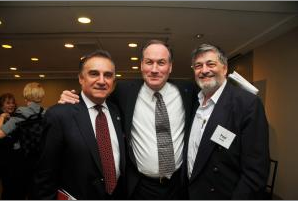Tony Lo Bianco, the Italian American actor from Brooklyn, was feeling depressed. He was at a luncheon for the Institute for the Study of Global Antisemitism and Policy (ISGAP), one of the regular informative events produced by Jeffrey Wiesenfeld at his office at Bernstein Global Wealth Management.
“I’ve attended many of these events,” Lo Bianco said, “and I’m depressed because of the hopelessness. It looks like we’re losing the battle in the colleges.”
Lo Bianco, star of the Academy Award-winning “The French Connection,” was listening to Charles Small, founding director of ISGAP, who told how Middle East Arab pressure in 2011 forced Yale to close down his institute, Yale Initiative for the Interdisciplinary Study of Antisemitism, and drive him off campus after five years of conferences and lecture series.
“Things are getting worse,” Lo Bianco concluded after hearing David Harris, executive director of the American Jewish Committee, describe Antisemitism is coming from three different directions: from the far right like the Golden Dawn in Greece and extremists in Hungary, from the far left such as the academic world, including Yale, to delegitimize the state of Israel, and from the Islamic world where they say we are all Semites and, besides, there was no Shoah.
“They are killing people only because they are Jews,” Harris said. “We have to recognize them and name names. Antisemitism is a disease that ultimately destroys a democratic society. The challenge we face is to wake up and smell the coffee.”
Why is Antisemitism happening? Another speaker at the luncheon, Bernard Lewis, the preeminent historian of Islam and the Middle East, said one cause in the ancient world is the Jews’ refusal to recognize any god but their own faceless God. The situation worsened during the Spanish Inquisition when the Christians forced the Jews to convert or leave the country.
Lewis pointed out that Muslims tolerated Jews and Christians as fellow believers in revelation—as long as they paid a required poll tax. Jews expelled from Christian Spain were welcomed by some Muslim countries. “Antisemitism is fairly new in the Middle East,” Lewis said. “This was introduced from Christian Europe.”
The event drew a standing room only audience in the Bernstein conference room. Among the guests were Helen Freedman, executive director of Americans for a Safe Israel; Dr. Paul Brody, vice president of the International Committee for the Land of Israel; Matthew Goldstein, the retiring chancellor of the City University of New York; Bernice Manocherian, former president of America Israel Public Affairs Committee (AIPAC); former judge Milton Mollen; and Elaine Wolfensohn.
One guest wondered whether the West can live with a nuclear Iran much like the U.S. and the Soviet Union existed under an understanding of Mutually Assured Destruction (MAD).
“When Ahmadinejad makes threats, we should take notice,” Lewis insisted. “To the Muslim world, Mutually Assured Destruction is not a deterrent. It is an inducement.”
One guest asked what can be done when nation building and dialogue in the Middle East don’t seem to be working.
“The entire Arab world,” Lewis explained, “has nothing but fossil fuels. Their exports amount to nothing more than oil and gas. Sooner or later that will be depleted. The Middle East will lapse into insignificance. That is beginning to happen. I would say that in the decades to come the Middle East will cease to matter.”
“Let’s bring those decades sooner,” Lo Bianco interjected, “We have all the energy we need in this country. “
Another guest was alarmed at the increasing presence of Muslims in Europe, where they are the majority in some areas.
“The answer is simple,” Lewis said. “Marry young and have children.” In other words, be fruitful and multiply.
Written by Tim Boxer.
Originally published on April 23, 2013 on The Jewish Week.

